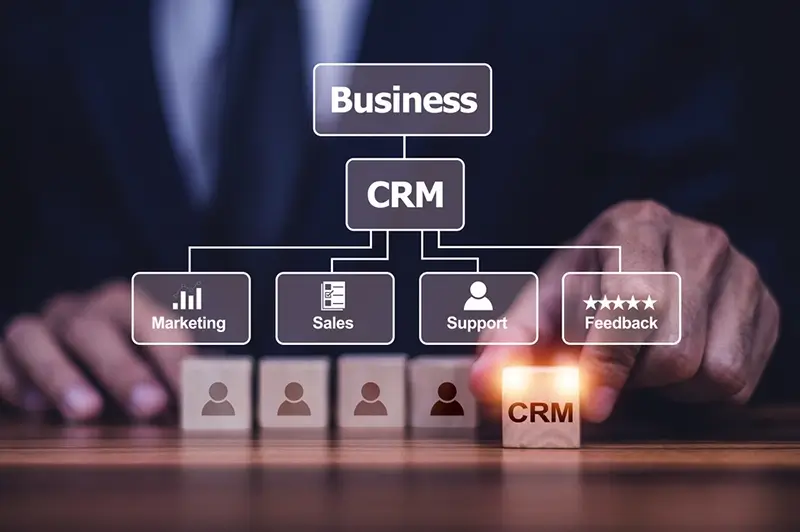What is CRM, and why is it used?
In today's fast-paced business world, customer relationship management (CRM) has become an essential tool for companies looking to stay ahead of the...
Enterprise Resource Planning (ERP) systems have become a critical component of business operations for companies of all sizes. These integrated software solutions enable organizations to streamline their workflows, optimize their resources, and improve their overall productivity. In this article, we'll explore what ERP is, how it works, and provide examples of the company's systems currently available on the market.
ERP is an acronym that stands for Enterprise Resource Planning. The primary objective of ERP is to create a unified system that coordinates different facets of a business, such as accounting, manufacturing, and sales. By using Enterprise Resource Planning, it is possible to automate and optimize procedures, while also having one accurate source of data that all departments can access.
ERP systems typically include modules for managing key business functions, such as financials, supply chain management, human resources, customer relationship management, and inventory management. By providing a centralized system for managing these functions, businesses can improve their efficiency, reduce errors, and gain greater visibility into their operations.
Enterprise Resource Planning systems work by integrating all of a company's business functions into a single, unified system. When a company implements an ERP system, it typically starts by mapping out its existing business processes and workflows. This allows them to identify areas where they can automate and streamline their operations.
Once the company has identified its workflows, it can begin configuring the ERP system to match its needs. This involves setting up the various modules within the system and defining how data will flow between them. For example, a company might configure its ERP system to automatically generate purchase orders when inventory levels fall below a certain threshold.
Once the ERP system is up and running, it provides a single source of truth for all relevant information. This means that all data is entered into the system once, and then can be accessed by anyone who needs it. A salesperson no longer needs to phone different departments to find out the status of an order; they can simply look it up in the system.
Learn more about our SAP Business One services
There are a wide variety of ERP systems available on the market today, each with its strengths and weaknesses. Here are some of the most popular ERP systems:
SAP ERP is one of the most widely used ERP systems in the world. It is a comprehensive system that includes modules for financials, supply chain management, human resources, and more. SAP ERP is highly custom-built and can be configured to meet the needs of businesses of all sizes.
Oracle ERP Cloud
Oracle ERP Cloud is a cloud-based ERP system that includes modules for financials, procurement, project management, and more. It is highly scalable and can be used by businesses of all sizes. Oracle ERP Cloud also includes advanced analytics capabilities, allowing businesses to gain insights into their operations and make data-driven decisions.
Microsoft Dynamics 365
Microsoft Dynamics 365 is a cloud-based ERP system that includes modules for financials, supply chain management, human resources, and more. It is highly custom-made and can be configured to meet the needs of businesses of all sizes. Microsoft Dynamics 365 also includes advanced analytics capabilities, allowing businesses to gain insights into their operations and make data-driven decisions.
NetSuite ERP
is a cloud-based ERP system that includes modules for financials, inventory management, order management, and more. It is highly scalable and can be used by businesses of all sizes. NetSuite ERP also includes advanced analytics capabilities, allowing businesses to gain insights into their operations and make data-driven decisions.
ERP systems offer a wide range of benefits for businesses of all sizes. Here are some of the key reasons why companies choose to implement ERP systems:
Streamline Workflows
ERP systems allow businesses to automate and streamline their workflows. By automating routine tasks, businesses can reduce errors and improve their overall efficiency, freeing up employees to focus on more strategic tasks.
Centralize Data
ERP systems provide a single source of truth for all relevant information. This means that everyone in the organization has access to the same data, reducing the risk of errors and improving decision-making.
Improve Visibility
ERP systems provide businesses with greater visibility into their operations. By providing real-time data on key business functions, such as inventory levels and customer orders, businesses can make data-driven decisions and respond more quickly to changing market conditions.
Increase Productivity
By automating routine tasks and providing employees with real-time data, ERP systems can help businesses increase their overall productivity. This can lead to cost savings and improved profitability.
One of the key modules in most ERP systems is accounting. Accounting modules typically include features such as accounts payable, accounts receivable, general ledger, and financial reporting.
By integrating accounting functions into the ERP system, businesses can improve their overall financial management. For example, they can automate routine tasks such as invoicing and payments, reducing the risk of errors and improving cash flow management.
ERP role play is a training method that is used to teach employees how to use an ERP system. During an ERP role play, employees are given scenarios and asked to use the ERP system to solve a particular problem.
ERP role play is an effective training method because it allows employees to practice using the ERP system in a safe, controlled environment. This helps them to become more comfortable with the system and to develop the skills they need to use it effectively in their day-to-day work.
There are a wide variety of ERP software examples available on the market today. Here are a few examples:
Odoo: This is an open-source system that includes modules for financials, inventory management, project management, and more. It is highly customizable and can be used by businesses of all sizes.
Infor ERP: This is a cloud-based system that includes modules for financials, supply chain management, human resources, and more. It is highly scalable and can be used by businesses of all sizes.
Epicor ERP: This is a comprehensive system that includes modules for financials, supply chain management, human resources, and more. It is highly customizable and can be used by businesses of all sizes.
Sage Intacct: This is a cloud-based system that includes modules for financials, inventory management, project management, and more. It is highly scalable and can be used by businesses of all sizes
In conclusion, ERP systems are critical tools for businesses of all sizes. They enable organizations to streamline their workflows, centralize their data, and improve their overall efficiency. There are a wide variety of Enterprise Resource Planning systems available on the market today, each with its own strengths and weaknesses. By carefully evaluating their needs and selecting the right system, businesses can improve their operations and gain a competitive advantage in their industry.
Implementing an Enterprise Resource Planning system can be a complex and time-consuming process, requiring expertise and experience to ensure a successful deployment. That's why it's important to choose the right partner for your system implementation, and H&CO is a great choice for implementing SAP Business One.
One of the key reasons to choose H&CO for your SAP Business One implementation is their deep understanding of the product. H&CO has been working with SAP Business One for more than 30 years, and their team of experts has the knowledge and experience to ensure a successful deployment. They understand the ins and outs of the system and can help you to fully leverage its capabilities to meet your specific business needs.
Another reason to choose us for your SAP Business One implementation is its commitment to customer service. They take a personalized approach to every project, working closely with you to understand your unique business requirements and goals. They are dedicated to delivering a solution that meets your needs and exceeds your expectations, and they will work with you every step of the way to ensure a successful deployment.

In today's fast-paced business world, customer relationship management (CRM) has become an essential tool for companies looking to stay ahead of the...

The sale or transfer of U.S. real property interests by a foreign individual (the transferor) falls under the Foreign Investment in Real Property Tax...

The hype around intelligent technologies, such as artificial intelligence (AI) algorithms, natural language-based chatbots, and business...
